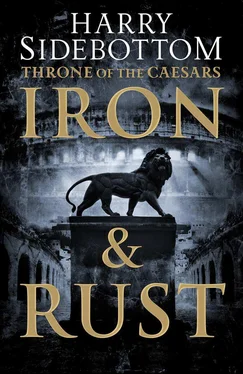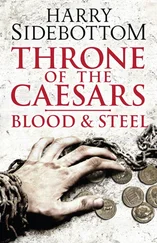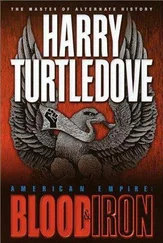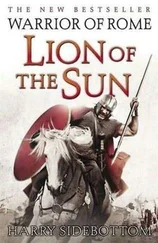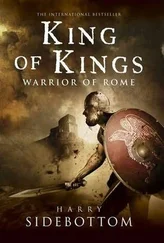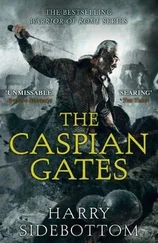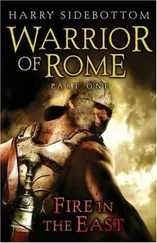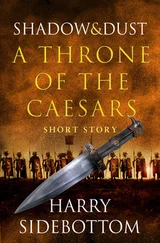Harry Sidebottom - Iron and Rust
Здесь есть возможность читать онлайн «Harry Sidebottom - Iron and Rust» — ознакомительный отрывок электронной книги совершенно бесплатно, а после прочтения отрывка купить полную версию. В некоторых случаях можно слушать аудио, скачать через торрент в формате fb2 и присутствует краткое содержание. Год выпуска: 2014, Издательство: HarperCollins Publishers, Жанр: Исторические приключения, на английском языке. Описание произведения, (предисловие) а так же отзывы посетителей доступны на портале библиотеки ЛибКат.
- Название:Iron and Rust
- Автор:
- Издательство:HarperCollins Publishers
- Жанр:
- Год:2014
- ISBN:нет данных
- Рейтинг книги:4 / 5. Голосов: 1
-
Избранное:Добавить в избранное
- Отзывы:
-
Ваша оценка:
- 80
- 1
- 2
- 3
- 4
- 5
Iron and Rust: краткое содержание, описание и аннотация
Предлагаем к чтению аннотацию, описание, краткое содержание или предисловие (зависит от того, что написал сам автор книги «Iron and Rust»). Если вы не нашли необходимую информацию о книге — напишите в комментариях, мы постараемся отыскать её.
Iron and Rust — читать онлайн ознакомительный отрывок
Ниже представлен текст книги, разбитый по страницам. Система сохранения места последней прочитанной страницы, позволяет с удобством читать онлайн бесплатно книгу «Iron and Rust», без необходимости каждый раз заново искать на чём Вы остановились. Поставьте закладку, и сможете в любой момент перейти на страницу, на которой закончили чтение.
Интервал:
Закладка:
The boy brought in some biscuit and cold bacon. Timesitheus ate it as he was helped into his equipment. Here he was, hundreds of miles of gloomy forest from safety, a victim of his own efficiency. Gods below, he did not want to die. He told himself to be a man. He was just tired. It had been hard to get any sleep with the low-lying valley and the surrounding woods echoing with the sounds of barbarian exultations. Once again he looked into the flat, black eyes of his fear and forced the rodent to scrabble back into some dark recess.
It was near dawn. A breeze was stirring the black trees. The low fires smoked with damp wood as Timesitheus walked through the encampment. There were high clouds, but it might not rain.
Maximinus could not stand any ostentation. The imperial pavilion was much smaller than in Alexander’s day, although still huge. Officers were waiting outside in the gloom. They stood in small groups or on their own. Few were talking. Sanctus, the ab Admissionibus , blocked the door.
‘Health and great joy.’ Timesitheus greeted Macedo in their native language. The Greek commander was standing on his own.
‘Health and great joy.’ Macedo’s tone belied his words.
‘Is the Emperor awake?’
‘Yes.’
‘Has anyone been admitted?’
‘The triumvirate.’ Since they had put the Thracian on the throne, the three Senators Vopiscus, Honoratus and Catius Clemens were seldom apart, and almost always close to their Emperor. Their collective nickname was fitting. ‘And the favoured equestrians.’ There was no need to name them.
‘Anullinus is Praetorian Prefect, and Volo the head of his frumentarii .’ Timesitheus lowered his voice. ‘But in Mogontiacum it was we who saved Maximinus as certainly as Julius Capitolinus’ 2nd Legion in that swamp. And Domitius has done nothing.’
Macedo grunted.
‘Yet they are in there, and we are out here.’
‘You will get your reward in Bithynia-Pontus.’ Macedo did not try to hide his bitterness. ‘And I will get nothing.’
Timesitheus smiled. ‘If we live through this, I will get my reward.’
Macedo glowered. ‘If we live through this, I will get nothing.’
The courtly voice of the ab Admissionibus announced that His Sacred Majesty would see his loyal officers.
Maximinus sat on the ivory throne. On his right was the triumvirate, on his left the four equestrians. Behind him stood his son Maximus and another youth, some second cousin from the Thracian hill country called Rutilus. The other figure, towards the rear of the room, was far more disconcerting. Everyone knew that Ababa, the druid woman, had travelled with the expedition. It was rumoured she went to Maximinus in the dead of the night, to satisfy his lusts or to practise unholy sacrifices, perhaps to do both. Yet so far she had never appeared in public with the Emperor.
Timesitheus studied Ababa. Neither old, nor young, she was very tall, her face not unattractive, unmarked by the torture she had suffered in the previous reign, her figure hidden by her cloak. Having a woman at a council of war was always a mistake. Cleopatra had done Antony no good. Having a northern barbarian woman, one tainted with proximity to alien gods, would disturb all the high command. Worse, this was the German bitch that had prophesied the death of Alexander.
Almost every decision Maximinus had made in his short reign had been bad. Before they left Mogontiacum, buoyed up by the influx of wealth from the crown gold offered on his accession and the confiscated estates of those condemned with Magnus, Maximinus had decreed that the pay of all soldiers would be doubled. The triumvirate had been unable to dissuade him. Once announced, there could be no going back. The thing was irrevocable — and completely unsustainable.
‘Fellow-soldiers.’ Maximinus got to his feet. His bulk dominated the room. ‘By their treachery the Germans believe they have put us in a bad position. They are wrong. Since we set out, we have sought battle, and they have avoided it. Now they have delivered themselves into our hands.’ The grey eyes of Maximinus shone in his great white face. ‘They have the short-lived ferocity of beasts. We have courage and discipline. They have blind savagery. We have torsion artillery, and we have a plan.’
Despite his misgivings, the harsh, grating voice lifted Timesitheus. Led by a Titan like this, an elemental force from a bygone age, a new Prometheus, who or what could stand against them? They could storm the heavens.
CHAPTER 15
The Far North
The Harzhorn Mountains,
the Ides of July, AD235
On the third morning Maximinus climbed the tall tribunal in front of the camp, and the trumpets rang out as they had on the previous two days. He ran his eyes over the close-packed ranks of his soldiers. Practice had made the manoeuvre quicker. All the units were in place, the last few wagons with the bolt-throwers being manhandled into line. Only an hour after sunrise. It had taken twice as long on the first day.
The Emperor looked out at the enemy position a little under four hundred paces distant. The pass was perfectly flat. The Germans had dug a shallow ditch across its entire frontage of some three hundred paces. Behind was an earth bank, four or five feet high and topped with a wooden palisade. In front of these defences were two bands of obstacles. First, an attacker would have to clamber over a tangle of felled trees, their branches cut into jagged points. Then he would have to avoid putting a boot into the numerous half-concealed pits containing sharpened stakes. The soldiers called them stags and lilies. They would have to get through them under a murderous hail of missiles before even attempting to storm the wall. The Germans had created a fine killing ground.
The bluffs thrust up on either side. The eastern crest, off to the left, was higher, and further away. On the right the climb was shorter, but steeper, although landslips had left three natural ramps. There was timber on the heights, but no defences. Only isolated stands of trees here and there on the approaches. Most likely, every winter the run-off from torrential rains carried away topsoil and saplings.
The enemy camp was on a line of hills several hundred paces beyond the palisade. In that blue distance wagons, tents and shelters, hazed by the smoke of cooking fires, sprawled without discernible order. The barbarian numbers were unknowable, but without doubt huge. The chiefs of the Alamanni, Cherusci and their allies had ordered, cajoled or forced every warrior they could to gather in this remote place. Their summons had emptied the forests of Germania. They had brought their women and children to mark their valour, and to witness the destruction of the Roman army. If the gods were kind, Maximinus thought, they would regret that decision.
Now, in the raking light of early morning, there were few tribesmen to be seen along the palisade or up on the hills. They knew what was coming. And perhaps Maximinus’ ploy was working. Aspines, the a Studiis , had likened it to Alexander before the Hydaspes. The Macedonian had repeatedly led his army out, but not committed it to battle until the vigilance of his enemy had been worn down. Maximinus did not know about Indians, but these Germans lacked discipline. The gods willing, many would be back in their camp, lolling in indolence or drunken slumber.
Maximinus would have liked to continue for several more days, but Timesitheus had warned that supplies were dangerously low. The army had food for just five further days, and, although the Graeculus had had all the blacksmiths working day and night, there were only enough ballista bolts for one final extended barrage. When the battle was won, Maximinus would order the men to scour the ground to recover all the missiles they could find. When the battle was won. The thought tempted fate. Maximinus spat on his chest to avert bad luck.
Читать дальшеИнтервал:
Закладка:
Похожие книги на «Iron and Rust»
Представляем Вашему вниманию похожие книги на «Iron and Rust» списком для выбора. Мы отобрали схожую по названию и смыслу литературу в надежде предоставить читателям больше вариантов отыскать новые, интересные, ещё непрочитанные произведения.
Обсуждение, отзывы о книге «Iron and Rust» и просто собственные мнения читателей. Оставьте ваши комментарии, напишите, что Вы думаете о произведении, его смысле или главных героях. Укажите что конкретно понравилось, а что нет, и почему Вы так считаете.
